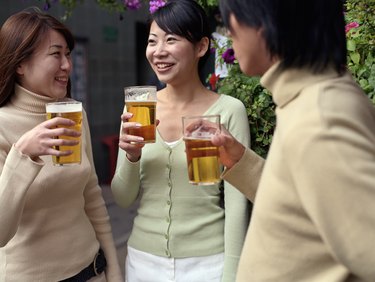
Gout, also called gouty arthritis, is a painful type of arthritis that usually affects a single joint. Gout commonly affects the big toe, resulting in a painful, red, warm toe. Gout is caused by a buildup of a substance called uric acid in a joint. Uric acid in turn is formed by the breakdown of purines, which are made by the body and also found in many foods. People with gout should avoid foods high in purines as well as foods that hamper the body's ability to dispose of uric acid.
Step 1
Avoid alcohol--in particular beer, which has a high purine content. Studies show that men who drink alcohol daily have twice the risk of developing gout as those who do not drink alcohol.
Video of the Day
Step 2
Avoid meats and fish high in purines. Meats highest in purines are organ meats such as liver, brain, kidney and sweetbread. Fish highest in purines are sardines and anchovies. Limit meat to 3 oz. per meal.
Step 3
Avoid vegetables and beans that are high in purines. Soybeans, lentils and chick peas all have a moderately-high level of purines and should be avoided.
Step 4
Avoid fatty foods. Fat impairs the ability of the kidneys to dispose of uric acid. Examples of foods to avoid are fried foods, ice cream, cream sauces and high-fat desserts.
Step 5
Avoid certain medications. By worsening the kidneys' ability to dispose of uric acid, thiazide diuretics can trigger a gouty attack and should be avoided by people with gout.
Warning
Consult with a physician or other health professional if you have or think you may have gout. Consult with a doctor, dietitian or nutritionist before beginning a specialized diet.
Video of the Day
Is this an emergency? If you are experiencing serious medical symptoms, please see the National Library of Medicine’s list of signs you need emergency medical attention or call 911.